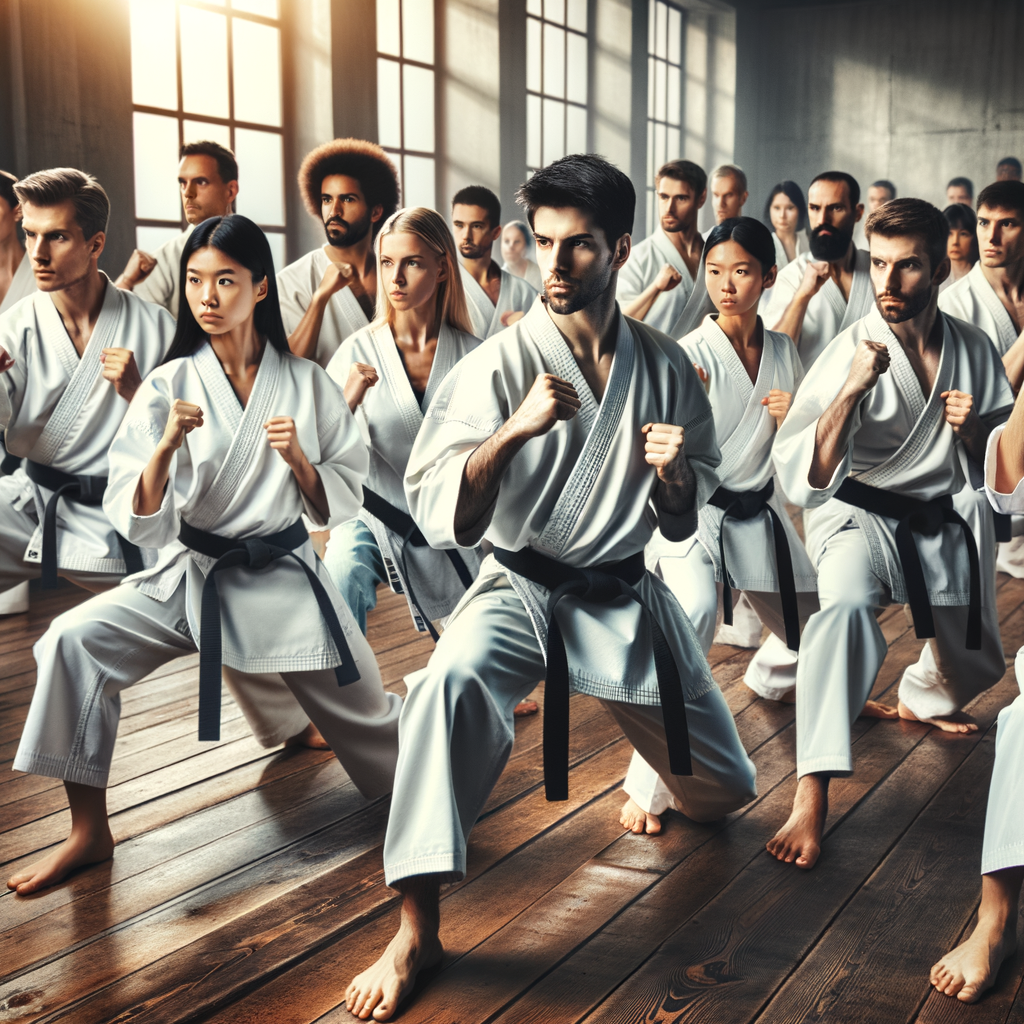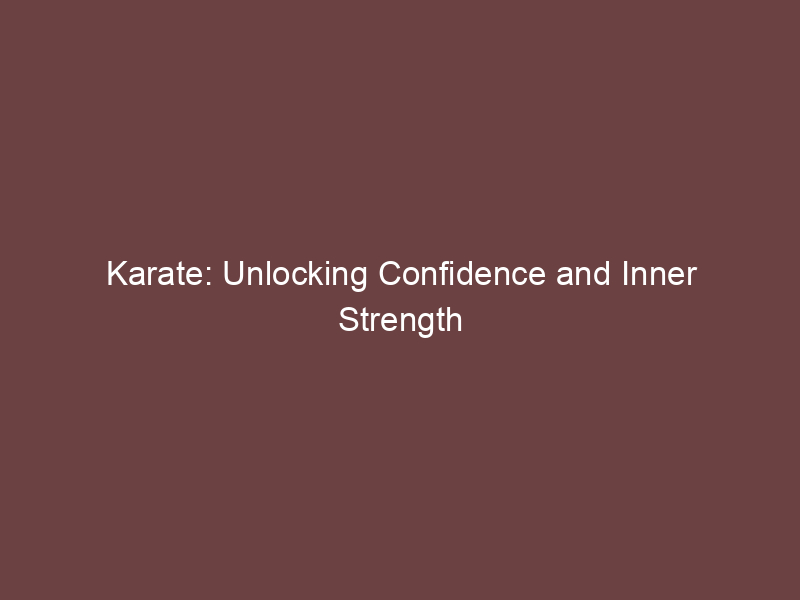
Introduction to Karate
-
Understanding the Basics of Karate
It focuses on self-defense using punches, kicks, and blocks. Karate also teaches respect and discipline. Students wear a uniform called a “gi” and earn colored belts to show their progress.
-
History and Origin of Karate
Influenced by Chinese martial arts. The word “karate” means “empty hand,” showing that it is a form of fighting without weapons. Karate became popular in Japan in the early 20th century and spread worldwide.
-
Popularity of Karate Worldwide
It is an Olympic sport and has many international competitions. Karate schools, known as “dojos,” can be found in almost every country. Famous Karate movies and TV shows have also helped make it popular.
Karate for Self-Confidence
Building Confidence through Karate Training
- How Karate training boosts self-esteem:
When students learn new skills and techniques, they feel a sense of accomplishment. This boosts their confidence and self-worth. According to a study from the Journal of Sport and Exercise Psychology, participants in martial arts reported higher self-esteem compared to those who did not practice martial arts. - Examples of confidence building in Karate:
Students often start as beginners and work their way up through different belt levels. Each new belt earned is a milestone that shows progress and builds confidence. For example, a student who starts with a white belt and progresses to a yellow belt feels a sense of achievement. Additionally, participating in Karate tournaments and successfully performing katas (forms) in front of an audience can also significantly boost a student’s confidence.
Karate Benefits for Confidence
- Improvement in self-perception:
Karate helps you see yourself in a better light. When you learn new skills, you feel proud. This pride makes you think more positively about yourself. Studies show that physical activities like karate can boost self-esteem. - Enhancement of self-efficacy:
Karate teaches you to set goals and achieve them. Each time you master a move, your belief in your abilities grows. This confidence can help you in other parts of your life too. - Development of resilience:
You might fall, but you learn to get up and try again. This makes you stronger, not just physically, but mentally too. Resilience is a key skill for success in life.
| Benefit | Explanation |
|---|---|
| Improvement in self-perception | Karate helps you see yourself positively by learning new skills and feeling proud. |
| Enhancement of self-efficacy | Karate boosts your belief in your abilities by setting and achieving goals. |
| Development of resilience | Karate teaches you to bounce back from challenges, making you mentally stronger. |
Karate and Mental Health
Karate Mental Health Benefits
- Stress reduction through Karate: The physical activity releases endorphins, which are chemicals in the brain that act as natural painkillers and mood elevators. This can help you feel more relaxed and happy.
- Karate as a tool for managing anxiety: This can be very helpful for managing anxiety. By concentrating on your movements and breathing, you can learn to stay calm and centered, even in stressful situations.
Building Self-Esteem with Karate
- Role of Karate in Fostering Positive Self-ImageIt helps build a positive self-image. When you practice Karate, you learn to set goals and achieve them. This makes you feel good about yourself.
Karate also teaches you to respect yourself and others. This respect helps you see your own value. As you get better at Karate, you feel more confident. This confidence boosts your self-esteem.
According to a study on Wikipedia, many people who practice Karate report feeling better about themselves. They feel stronger and more capable.
-
Case Studies of Self-Esteem Improvement through Karate
- John’s Story: John was shy and didn’t believe in himself. After a year of Karate, he became more outgoing and confident. He even started helping others in his class.
- Lisa’s Journey: Lisa struggled with low self-esteem. Karate taught her discipline and self-respect. She now feels proud of her achievements and is more confident in school.
Karate for Personal Development
Karate Personal Development Benefits
- Enhancing discipline and focus through Karate: Students must follow rules and respect their teachers. This helps them stay focused and disciplined in other areas of life too. For example, a student who practices Karate might find it easier to concentrate on homework or chores.
- Building perseverance with Karate training: It takes time and effort to learn new moves and improve skills. This teaches students to keep trying, even when things are tough. Perseverance learned in Karate can help in school, sports, and other activities.
| Benefit | Description |
|---|---|
| Discipline and Focus | Karate helps students follow rules and stay focused, which can improve performance in school and other areas. |
| Perseverance | Through consistent practice, students learn to keep trying, even when faced with challenges. |
Karate for Kids
Karate for Kids Confidence
- Benefits of Karate in children’s confidence development:
When kids learn new moves and earn belts, they feel a sense of achievement. This boosts their self-esteem. For example, a study showed that children who practice martial arts have higher confidence levels compared to those who don’t. - How Karate helps in social skills development in children:
They learn to work in teams and respect others. This helps them develop social skills. For instance, during practice, children often pair up to practice moves, which teaches them cooperation and communication.
Karate and Self-Discipline
Karate Self-Discipline Benefits
- Role of Karate in promoting self-control:
It teaches students to control their actions and emotions. This is important both in the dojo (training hall) and in everyday life. For example, when practicing karate, students learn to focus their energy and movements, which helps them stay calm and collected in stressful situations. - Impact of Karate on personal responsibility and accountability:
Students are taught to be accountable for their progress and behavior. This means showing up for practice, putting in effort, and respecting others. Over time, these habits can help students become more responsible and reliable in other areas of their lives.
Karate as a Tool for Empowerment
Karate Empowerment Benefits
-
How Karate empowers individuals to overcome challenges:
When you learn a new move or master a technique, you feel a sense of achievement. This helps you believe in yourself and your abilities. For example, breaking a board with a kick shows you that you can do hard things with practice and determination.
-
Role of Karate in promoting personal strength and resilience:
It makes your body strong and fit. Mentally, it teaches you to stay calm and focused, even in tough situations. This resilience helps you handle stress better. Studies have shown that people who practice martial arts, like Karate, often have better mental health and are more resilient in the face of challenges.
Conclusion
- Reiteration of the key benefits of Karate: It helps build self-confidence, improves mental health, and promotes personal development. Karate also teaches self-discipline and empowers individuals.
- Encouragement for individuals to consider Karate for personal growth: If you want to grow as a person, consider trying Karate. It can help you become stronger, both mentally and physically. Karate is a great way to learn new skills and improve your life.






